Note: This newsletter is not investment advice.
Five years ago, Nvidia was a second-tier semiconductor company known for giving Call of Duty better resolution. Today it's the third-most-valuable company on Earth, with a dominant 80% share in AI chips, the processers underpinning the largest, fastest creation of value in history ($8 trillion). Since fellow AI supernova OpenAI released ChatGPT in October 2022, Nvidia's value has increased by $2 trillion, or about the value of Amazon. This week, Nvidia reported monster quarterly earnings - its core business, selling chips to data centers, was up 427% year over year.
Last year, at Cannes, Jensen Huang introduced himself to me and said "I love your videos." Not recognizing him, I asked if he'd like a photo. He said yes, we took the snap, and I kept walking. Since then, his company has added $1.3 trillion in value. I did Ketamine therapy, stopped drinking for 17 days, and installed a router with only the help of YouTube. It's been a big year for both of us.
There is near-universal agreement on the AI market's revolutionary potential, a historic consensus that explains the upward trajectory of AI stocks. In sum, everyone is barking up the same tree ... which makes us stupid. It also inspires a question: Are we in a bubble?
Bubble Psychology
In the 1630s, tulips were not getting any prettier or more useful, but people bid them up because they believed they'd be able to sell them to someone else at an even higher price. Aka the "greater fool" theory. Meme stocks could best be defined as the greatest fool theory, as many buyers are convinced they are part of a movement. Pro tip: If someone tells you to "stick it to the man," you are usually the stick. These kinds of bubbles are fragile, and they rarely get large in terms of the broader economy or last very long.
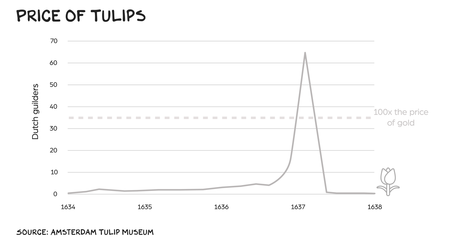
Bubbleicious
Multitrillion-dollar, economy-distorting bubbles occur when pure bubble psychology overlaps with real economic potential. This manifests as a self-propulsion machine - stock price increases validate assumptions and encourage more aggressive projections, which draws more speculators, who don't want to miss out, and so on, and so on. Exogenous factors including low interest rates (i.e. cheap money) can fuel them, but bubbles typically have an economic growth engine and an enduring technology at their core:
- The dot-com bubble of the late 90s was predicated on a thesis that proved out: The internet was the most transformative technology of this millennium, poised to create unprecedented value. That did happen, and several of the companies that appeared wildly overvalued turned out to have been bargains.
- The housing market bubble of the 2000s was a function of low interest rates, financialization, and other external factors, but under all that was a correct thesis: Land is finite, houses are essential, and we don't have enough of them. Nearly two decades later, we still don't.
- Crypto was a bubble largely fueled by psychological nonsense - the Bored Apes should have been called Bored Tulips. But blockchain technology made a case for providing real benefit, and the resilience of Bitcoin indicates it likely will endure as a store of value.
The Bubble This Time
The financial media will digress to one of its favorite games, "Is this a bubble or is AI for real?" The answer is yes. AI's economic promise feels real, obvious even. And that is what makes a bubble inevitable. Bubbles emerge in unexpected ways, for unpredictable reasons. Big bubbles inflate in similar ways. A transformative innovation emerges, capital rushes in, valuations increase, speculators add fuel, the atmosphere heats, the bubble grows, the cheap capital supercharges growth, and the wheel turns.
Of course we are in a bubble now - how could we not be after the mind-blowing debut of ChatGPT? AI is amazing, but the bubble-multiplier effect is very much in play. According to the :
The combined market value of Alphabet, Amazon, and Microsoft has jumped by $2.5trn during the ai boom. [This value creation] is 120 times the $20bn in revenue that generative AI is forecast to add to the cloud giants' sales in 2024.
That was in March. Now it's $3 trillion. So the market is valuing AI revenue at 150x. Pre-AI, Microsoft was valued at about 10x revenue, Alphabet at 5x, and Amazon at around 4x. Growing into this AI multiple will require these businesses to find another $500 billion in annual revenue among them, in addition to continued expansion of their non-AI business, the equivalent of adding more than Alphabet's revenue.
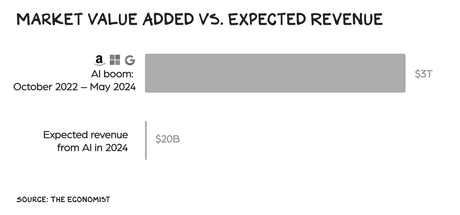
The darling of AI, Nvidia, has been painted into a corner of good problems. But, nonetheless, a corner. NYU prof Aswath Damodaran has calculated that Nvidia, to justify its valuation, will need not only to continue to dominate the market for AI chips, forecasted to grow aggressively, but also to dominate another market of similar scale. Think about this: Built into the price of Nvidia is the expectation the company will find another market as big as AI, and achieve similar dominance.
At the peak of the dot-com bubble, Google was a newcomer with the second-most-popular search engine, and Meta didn't exist. Today hundreds of AI startups aim to replicate that sort of success. One prominent VC tracks 1,400 AI startups, even in a tight VC investment climate. As the IPO pipeline widens, more firms will emerge ... and submerge. Many will fail - it's a bubble - but not all.
There are two important questions regarding AI, and neither is "are we in a bubble?" We are. The important questions are "when will it pop" and "who will endure?"
Get Rich Quick
Timing a bubble's pop correctly is likely the fastest way to become a billionaire, as the move in your direction, and the leverage on capital, is violent. John Paulson's hedge fund made $15 billion timing the housing bubble in 2007 (including $4 billion for himself); Michael Burry made a few hundred million and had a movie made about him, The Big Short. But timing is everything, and aggressive short positions can also pop. Burry shorted Tesla in 2020, only to watch it double before unloading his short ... at the peak. George Soros took " whopping losses" shorting the dot-com market in 1999. Legendary investor Julian Robertson turned $8 million into $22 billion before he, too, bet against the dot-com bubble ... and gave up on his play a month before it popped. Showing up early sunk Tiger Management. If that name sounds familiar, it's because Robertson subsequently staked Tiger Global, which suffered from PTSD - the firm lost $60 billion staying long on tech in 2022. The lesson(s) from investing history all point to one thing: Nobody has any idea. The way to get rich is slowly, buying the whole haystack via low-cost ETFs. But I digress.
Public Service Announcement: Nobody knows what will happen - you should diversify and not try to time the market.
If I knew when the AI bubble was going to detonate, I wouldn't be discussing it here but selling everything to buy deeply out-of-the-money put options in MSFT, NVDA, and other AI stocks, cash out after the crash, and buy Australia. Alas, I'm more confident about how, vs. when, the pop will play out.
Airpocket
Airplanes follow flight patterns, calculated to maximize safety and passenger comfort while minimizing fuel use. Atmosphere is not a static medium, however, and sometimes planes encounter localized areas of rapid air movement, aka turbulence. A sudden downdraft can cause a plane to drop hundreds or thousands of feet in seconds, an event known as hitting an air pocket. Most are harmless, but strong downdrafts can be terrifying and dangerous. Just this week, a Singapore Air 777 dropped so sharply that one passenger was killed and six more sent to the hospital.
Modern airplanes recover from hitting an air pocket in seconds, but frothy markets take longer to find their footing. Here's one scenario: A major non-tech company (e.g., Walmart, JPM, Procter & Gamble) will announce it is paring back on its AI initiatives. Shuttering its AI team, calling off a joint venture, etc. "We remain optimistic about the long-term impact of AI on our business, but we are not seeing the ROI initially projected and are scaling back our level of capital investment in this technology." The same cycle that drove prices up will pare them, only faster: Analysts will identify which AI players were selling to the company, and every CEO on every earnings call that week will be asked if they're cutting back their AI spend. Trend reversals travel through earnings calls like cold viruses through kindergartens, and by the end of the month, no CEO will want to be on the last helicopter out of AI Saigon. AI stocks will decline, and once they do, speculators will begin selling, creating a stampede for the exits. Trillions of dollars in market cap erased in weeks. Someone will time it perfectly. Most won't.
The air pocket that popped the dot-com bubble blew in from the east. On Friday, March 10, 2000, the Nasdaq hit 5,049. The next Monday, Japanese economic data showed the country's economy had contracted in the fourth quarter of 1999, and the bad news was enough to spook the speculative market. The day's downdraft hammered the Nasdaq to its fourth-biggest point loss ever. It wouldn't break 5,000 again for 15 years. The housing bubble hit its own air pocket seven years later, in March 2007, when mortgage lender New Century Financial collapsed. The market's momentum continued for a few months but peaked in October before spiraling toward Earth.
Bubble Blast
The collapse of a major bubble can have far-reaching effects. The collapse of the housing bubble in 2007 spread into the banking system in 2008 and threatened the global economy - if you're between the ages of 16 and 94, that will, hopefully, be the most significant financial event of your lifetime.
We. Hope.
The dot-com meltdown mostly hurt people who could afford it, who'd taken an eyes-wide-open risk. I knew a lot of them - 100 of them worked for me. We called half of them into a conference room and laid them off, which still nauseates me when I think about it. The sin was hiring them in the first place - zealous hiring is a hallmark of bubble economics, both a symptom and a cause in the self-reinforcing cycle of bubbles. They were (mostly) great people, but we'd bought the same trope as everyone else: If you hire them, it (revenue) will come. The same was true all over the Valley and in the mini-Valleys that had sprung up in the bubble (Silicon Alley in NYC, Silicon Forest in Seattle - there were even a few Silicon Prairies). As in every Patagonia vest recession, most of those who were laid off are highly educated, employable young people who went on to other opportunities. There were second-order effects as well. There was a mild recession in 2000, which was bad especially for people entering the workforce or hoping to retire, and telco firms that had banked on never-ending broadband expansion got crushed. The broader market decline pushed companies with heavy pension obligations into bankruptcy.
Right now, it feels like the AI bubble is more in dot-com territory than housing-crisis country. But the bigger it gets, the more leveraged we become, and the larger the blast radius. It would be healthy if some of the air came out in 2024, but Nvidia's monster quarter will likely keep inflating the sector.
Cisco
Timing the bubble's end is less interesting than looking past it. If AI is half the technological breakthrough it feels like, it's going to sustain long-term value creation ... but where? One aspect of this bubble that's caught my attention recently is how similar the narrative we hear today about Nvidia is to what people said about Cisco during the dot-com runup. Cisco is/was a hardware company that makes a lot of the gear the internet runs on. In 1999 it was the ultimate "picks and shovels" play, the company every tech fund had to have in its portfolio, and the stock you owned if you considered yourself a serious investor, not a speculator. Let the kids buy Pets.com and Amazon. That's essentially the narrative on Nvidia today.
Only it turned out there was a lot of that "serious" money, and boring Cisco increased in price 40x between 1995 and 2000. When everything crashed in 2000, Cisco went with it. Though the smart buy took less of a beating than Amazon, and much less than Pets.com, which went out of business that fall.
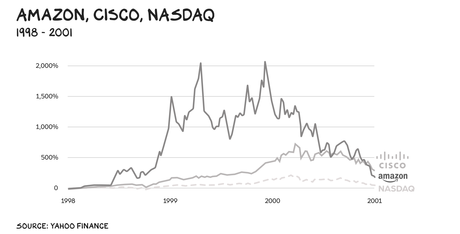
Long term, Cisco did "OK," staying in business and beating the Nasdaq through most of the 2000s, though it hasn't kept pace with Big Tech's surge since 2020. (Long-term comps to an index like this are rigged against individual stocks, since indexes benefit from survivorship bias.)
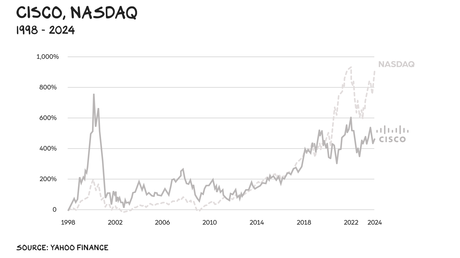
Was Cisco a better bet than Amazon? Not even close. In fact, if on March 10, 2000, the peak of the bubble, you'd put a tenth of your money into 10 of the riskiest dot-com stocks rather than Cisco, you would still have outperformed Cisco (and the broader market) by over 15x, as long as one of those risky stocks was Amazon.
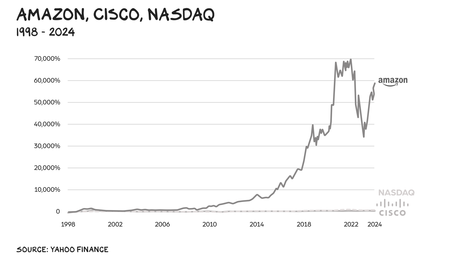
Pop
There are plenty of differences between dot-com and AI, and between Cisco and Nvidia. For one, Nvidia's runup has been fueled by spectacular earnings growth as well as hype, while Cisco benefitted from the time-limited Y2K investment boom. But when the "safe choice" is one of the frothiest stocks, we are a) in a bubble, and b) no longer playing it safe. The market is not necessarily rational in the short term, but over the long term, risk and return align. If Nvidia is the sure thing in this market, then it will generate sure-thing returns - aka it will track the market. If you're expecting Amazon circa 1999-2024 returns from Nvidia, then you should also expect Pets.com risk. This is not your pilot speaking, but do buckle up and make sure your tray table is secured.
Life is so rich,

P.S. This week on our new Thursday edition of the Prof G Markets podcast, Josh Brown, co-founder and CEO of Ritholtz Wealth, returned to the show to discuss what's driving the current bull market. Listen here or watch.
P.P.S. Section's popular AI Crash Course runs June 10-17. Sign up now and become an AI guru in one week.

